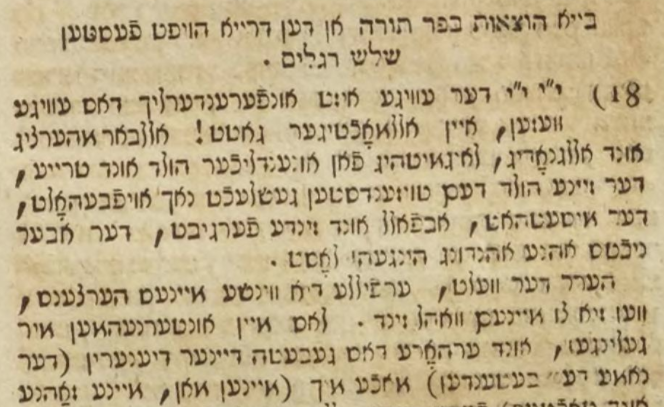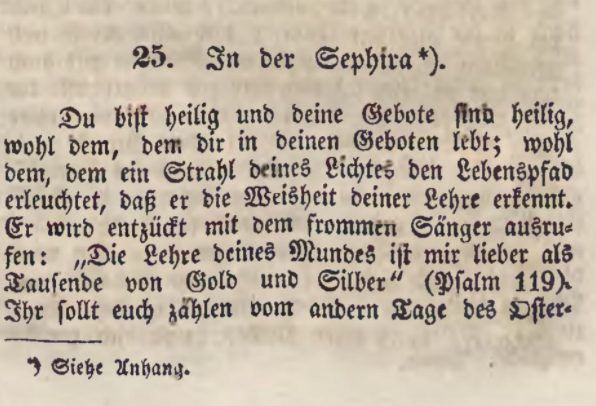| Source (German) | Translation (English) |
|---|---|
[Am Osterfeste, Paßah פסח (v.2)]. |
[On the Spring Festival, Pesaḥ (v.2)]. |
Gott unserer Väter! wie ein gütiger Vater hast du dich herabgelassen, das menschliche Geschlecht durch mannigfaltige freudige und traurige Schicksale zu erziehen, es zu belehren, um es seiner Bestimmung zuzuführen und es in diesem Leben glücklich und in einem bessern Leben glückselig zu machen. Freudig danken wir dir an diesem heiligen Feste, daß deine heilige Schrift das Fest der ungesäuerten Brode, das Fest des Frühlings, das Fest der Ueberschreitung nennt. |
God of our fathers, like a kind father you have deigned to educate the human race through manifold joyful and sorrowful destinies, to instruct them in order to lead them to their destiny and to make them happy in this life and blissful in a better life. We joyfully thank you on this holy feast that your holy scripture calls the Festival of Unleavened Bread [matsah], the Festival of Spring [aviv], the Festival of Passover [pesaḥ]. |
Wohl wissend, daß der Mensch geneigt ist, deine Wohlthaten unbeachtet zu lassen, und in der Menge und Mannigfaltigkeit des Sichtbaren das Unsichtbare zu vergessen, hast du uns sinnliche Erinnerungsmittel gegeben, Zeremonien und Gebräuche, um täglich und stündlich an das erinnert zu werden, was wir zu glauben und zu hoffen haben. Laß uns nicht thörichter Weise deine heiligen Anordnungen gering achten, oder sie bloß ausüben ohne zu denken. Möge es unserm Geiste gegenwärtig sein, daß jedes Wort deiner heiligen Schrift bedeutungsvoll ist. Der Name des heutigen Tages: „Fest der ungesäuerten Brode”, sei uns Erinnerung, uns von sinnlicher Lust loszureißen, und nicht unter der Last des Ueberflusses auf der Reise des Lebens zu erliegen. Wie unsere Vorfahren, wohl wissend, daß sie einem gelobten Lande entgegen gehen, das ihnen mehr Seligkeit gewähren würde, als Egyptens [S]chätze, so laß auch uns nur auf das Nothdürftige zur Lebensreise trachten, und nicht wie das vermischte Volk in Egypten nach Schätzen trachten und zu ihnen sprechen: „das sind deine Götter, Israel!” |
Knowing well that man is inclined to disregard your benefits and to forget the invisible in the multitude and variety of the visible, you havet given us sensual reminders, ceremonies and customs, to be reminded daily and hourly of what we have to believe and hope for. Let us not foolishly disregard your holy ordinances, or merely practice them without thinking. May it be present to our minds that every word of your holy scripture is meaningful. The name of today: “Festival of Unleavened Bread,” be a reminder to us to tear ourselves away from sensual pleasure, and not to succumb under the burden of abundance on the journey of life. As our ancestors, knowing well that they were going toward a promised land that would grant them more bliss than Egypt’s treasures, so let us also seek only the necessities of life’s journey, and not, like the mingled people of Egypt, seek treasures/shadows[1] The German here is ‘Schätzen’ (treasures) but the play on words here implies ‘Schätten’ (shadows). –ANV and say to them, “These are your gods, Israel!”[2] A midrashic reading of Exodus 32:4, where the blame of the sin of the golden calf is placed on the Erev Rav. Find Rashi on Exodus 32:4.4 (אלה אלהיך). |
Laß uns das Gute dieser Erde freudig aus deiner Vaterhand empfangen, wenn auch etwas Bitteres beigemischt ist. Ist auch unser Leben durch viele Leiden getrübt, so mögen wir nicht vergessen, daß dieses Erdenleben eine Prüfungszeit ist, und du uns unter Entbehrungen Schmerz, durch diese Wüste, in das gelobte Land jenseits führst. Du läßt uns ja nie in Leiden ganz versinken, und wenn die Hoffnung sinken will, so bereitest du uns ein Ueberschreitungsfest; deine strafende Hand geht schonend und rettend an uns vorüber. Wie unsere Vorfahren das Ueberschreitungsopfer nach deiner göttlichen Vorschrift verzehrt haben, in Gesellschaften von Hausgenossen, Freunden und Nachbarn, mit gegürteten Hüften, den Reisestab in der Hand; so laß uns die Freuden dieser Erde gern mit unseren Nebenmenschen theilen als Brüder, als Kinder des ewigen Vaters. Und laß uns nie vergessen, daß wir keine bleibende Stätte hier auf Erden haben, und jeder Zeit bereit sein müssen zur großen Reise, den Berg des Herrn zu besteigen, wo nur diejenigen hingelangen, die redlich wandeln und Gutes thun (Psalm 15). Müssen wir auch hieniden oft unser Brod mit dem Salze der Thränen genießen, so sei deine Verheißung unser Trost, daß des Frommen und Guten ewige Seligkeit wartet an deiner rechten ewiglich. Amen. |
Let us joyfully receive the good of this earth from your Father’s hand, even if there is something bitter mixed in. Even if our life is clouded by many sufferings, let us not forget that this life on earth is a time of trial, and that you lead us through hardships and pain, through this wasteland, to the promised land beyond. You never let us sink completely into suffering, and when hope wants to sink, you prepare for us a festival of passing over; your punishing hand passes us by, sparing and saving. As our ancestors ate the sin offering according to your divine command, in the company of housemates, friends and neighbors, with girded hips, travel staff in hand; so let us gladly share the joys of this earth with our neighbors as brothers, as children of the eternal Father. And let us never forget that we have no permanent place here on earth, and must be ready at all times for the great journey to climb the mountain of the Lord, where only those go who walk uprightly and do good (Psalms 15:1-5). Even if we often have to eat our bread with the salt of tears, may your promise be our comfort, that the eternal blessedness of the good and the righteous waits at your right hand forever. Amen. |
“Desselben Inhalts [Am Osterfeste, Paßah (פסח) v.2]” was translated/adapted by Yehoshua Heshil Miro and published in his anthology of teḥinot, בית יעקב (Beit Yaaqov) Allgemeines Gebetbuch für gebildete Frauen mosaischer Religion. It first appears in the 1829 edition, תחנות Teḥinot ein Gebetbuch für gebildete Frauenzimmer mosaischer Religion as teḥinah №24 on pp. 30-32. In the 1835 edition, it appears as teḥinah №24 on pp. 35-37. In the 1842 edition, it appears as teḥinah №26 on pp. 38-40.
We welcome corrections and improvements. The transcription of the German from Latin script in Fraktur type provided machine-readable text for a machine translation by DeepL, which we then edited for accuracy and clarity. –Aharon Varady
Source(s)


Notes

“Am Osterfeste, Paßah (פסח) [v.2] | Prayer on the Spring Festival, Pesaḥ (v.2) — a teḥinah by Yehoshua Heshil Miro (1829)” is shared through the Open Siddur Project with a Creative Commons Attribution-ShareAlike 4.0 International copyleft license.










Leave a Reply